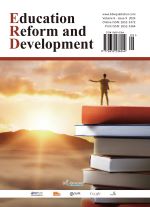Abstract
With the rapid development of society and the continuous progress of technology, college education is facing unprecedented challenges and opportunities. Especially in the background of the integration of production and education, the teaching reform of college physics is particularly important as a compulsory basic course for science and engineering students. This paper aims to discuss the research and practice of the teaching reform of college physics under the background of the integration of production and education, in order to provide useful reference for improving the teaching quality and cultivating high-quality talents meeting the needs of society.
References
Ministry of Education of China, 2017, Several Opinions of the General Office of the State Council on Deepening the Integration of Industry and Education. Bulletin of the Ministry of Education of the People’s Republic of China, 2017(12): 2–9.
Wang C, 2024, Exploration and Practice of Differentiated Teaching Reform for Physics Graduate Students Under the Background of Integration of Industry and Education. Economist, 2024(3): 236–237.
Wei M, Chen D, Yang M, et al., 2023, Reform and Exploration of the “U-G-S” Education System for Full-Time Master’s Degree of Education Based on the Integration of Industry and Education: Taking Subject Teaching (Physics) Major as an Example. Journal of Guizhou Normal University, 39(6): 34–40.
Gao B, Zhang Q, Zhang J, et al., 2023, The Role of Industry-University Collaborative Education Model on the Construction of University Physics Resource Banks in the Context of New Engineering. University Physics, 42(5): 46–50.
Zhao H, Wang C, 2023, Exploration of the Teaching Reform of Polymer Physics Courses Based on “Integration of Industry and Education” Under the Background of First-Class Application-Oriented Undergraduate Majors: Taking Yancheng Institute of Technology as an Example. Hua Zhang, 2023(5): 18–20.
Wu Z, 2023, Analysis on the Talent Training Model of School-Enterprise Cooperation in Running Schools in Physics Majors. Chinese and Foreign Corporate Culture, 2023(3): 226–228.
Yu H, Chen Y, Bin Y, 2022, Exploration of Integrated Teaching of Industry and Teaching in Physical Chemistry Courses. Guangzhou Chemical Industry, 50(18): 179–181.
Li Y, Zhang P, Li L, et al., 2022, Reform Measures for College Physics Teaching Under the New Engineering Concept. Journal of Suzhou Institute of Education, 25(4): 56–58 + 115.
Li H, Guan T, 2022, Curriculum System Reform in Application-Oriented Undergraduate Colleges Under the Background of School-Enterprise Cooperation: Taking Physical Experiment Courses as an Example. Modern Vocational Education, 2022(31): 97–99.
Wang L, Huang Y, Wu X, et al., 2022, Preliminary Study on the Reform of Physical Chemistry Experimental Teaching Under the Background of Integration of Industry and Education. Contemporary Chemical Research, 2022(8): 143–145.
Liu L, Wang Y, Jiang P, 2022, Construction of a New Engineering Talent Training Community Based on the Integration of Industry and Education: Taking the Course of “Semiconductor Physics and Devices” as an Example. Technology Trend, 2022(2): 29–31.
Du W, Xiao J, Chen L, et al., 2021, Practical Exploration of the Teaching Reform of Integrated Industry and Education in the Course of Photovoltaic Cell Principles and Technology. Modern Vocational Education, 2021(31): 80–81.
Xu M, Zhang T, 2020, Research on the Reform and Innovation of Semiconductor Physics Curriculum Based on the Mechanism of “Integration of Industry and Education, School-Enterprise Cooperation.” Science and Education Guide (Next Ten Days), 2020(27): 98–99.
Wang L, Chen R, 2020, College Physics Curriculum Teaching Reform in the Context of Application-Oriented Transformation. Higher Education Journal, 2020(6): 123–125.
Shen L, Shan H, 2019, Research on the Reform of Public Basic Courses Under the Joint Training Model of Higher Vocational Schools and Enterprises: Taking Physics Teaching for Aviation Maintenance Professional Qualifications as an Example. Journal of Liaoning Province Transportation College, 21(4): 72–75.
